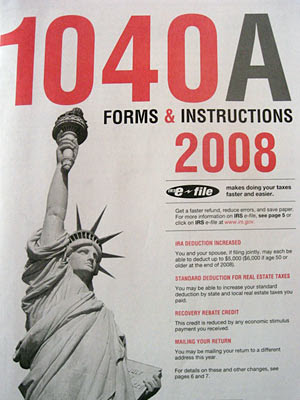
With each new year comes a new batch of tax rules and miscellaneous changes to the laws that taxpayers need to be aware of. There's no denying that the tax code in the United States is incredibly complex, and there are tons of changes.
Recovery Rebate Credit
If you weren't eligible for an economic stimulus payment in 2008, you might still be able to get that money. The initial payments were based on your 2007 income, and if your income was too low or too high, you may have missed out. You can now use your 2008 income to collect, and the IRS is offering help in calculating whether you qualify.
AMT Exemption Increased
The Alternative Minimum Tax (AMT) is a law that was created to make sure high income earners didn't get out of paying income taxes. Now this rule is affecting more middle-income taxpayers, but the "bailout bill" upped the exemption amount for 2008 to spare more taxpayers from the AMT for one more year.
First Time Homebuyer Credit
If you bought your first home between April 9, 2008 and June 30, 2009, you might qualify for a new credit. Taxpayers can get up to $7,500 from the federal government, which has to be paid back over 15 years at a rate of $500 per year. It amounts to an interest-free loan from Uncle Sam that can help you get your first house.
Tax Relief for Midwest Disaster Areas
If you lived in certain Midwest states that were affected by severe storms, tornadoes or flooding that happened between May 19 and August 1, 2008, you can receive special tax breaks. The rules include reduced restrictions on casualty loss deductions and charitable contribution deductions. There is also an exemption available if you provided housing to a victim of these disasters.
Increased Contribution Limits for IRAs
The tax rules permit taxpayers to contribute to traditional IRAs and Roth IRAs if their income falls within certain parameters. If your income is too high, you are limited in these contributions. All of the limits increased for 2008, which means taxpayers with higher income might still be able to contribute.
Standard Mileage Rate Changed
The standard mileage rate for business use of your vehicle was 50.5 cents per mile for the first six months of 2008, and 58.5 cents per mile for the rest of the year. The rates also changed for miles driven for medical reasons or charitable purposes.
Capital Gains Taxes Lowered
Those with lower incomes will benefit from a reduction in the lowest capital gains rate. The formerly 5% rate for married taxpayers with income under $65,100 and single taxpayers with income under $32,500 has now been reduced to 0%.
Kiddie Tax Changes
The rules related to investment income of children have changed to include students between ages 18 and 24 who are not financially reporting themselves. A child with investment income greater than $1,800 must be taxed at the parent's tax rate to avoid shifting of investments to children to escape income taxes.
Required Minimum Distributions From IRAs
Retirees with tax-deferred retirement funds such as 401(k)s and IRAs are required to take minimum amounts out of those funds once they reach age 70 ½ . The government requires this because those amounts taken out are taxable on withdrawal, and it ensures the IRS gets something from retirees. Because of the stock market troubles, RMDs are suspended for 2009. That doesn't help when preparing 2008 taxes, but is important to note for planning for 2009.
Free Tax Help
Low income and elderly taxpayers have several options for free tax help. The most extensive option is the Volunteer Income Tax Assistance program. Qualified tax preparers volunteer their time to help answer tax questions and prepare basic tax returns. Taxpayers can also get assistance by calling the IRS or visiting one of their walk-in centers.
No comments:
Post a Comment